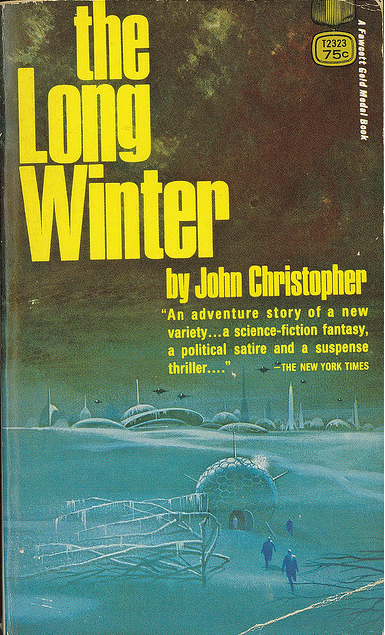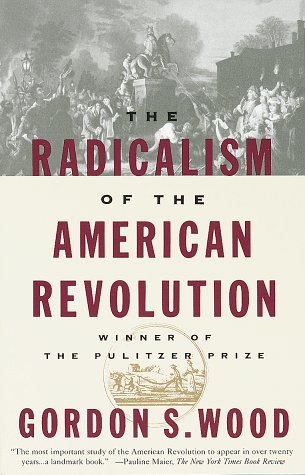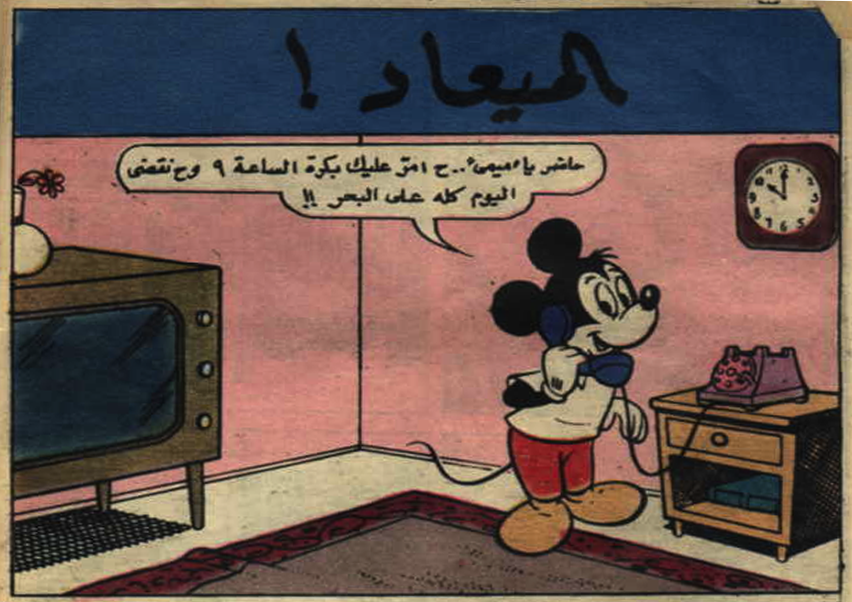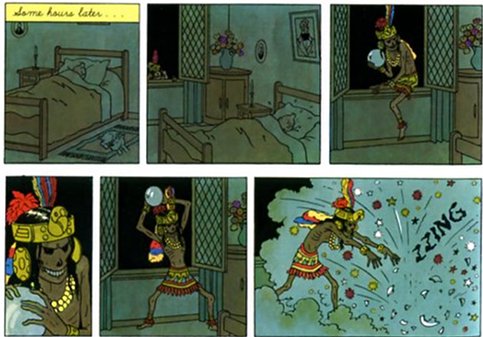Howard Zinn, Mike Konopacki, Paul Buhle
A People’s History of American Empire: A Graphic Adaptation
Metropolitan Books
I decided to review A People’s History of American Empire to answer one burning question: could Zinn possibly be as boring a writer as I remembered?
With some assurance, I can now say that the answer to this question is, decidedly, yes. Mike Konopacki and Paul Buhle have created a graphic adaptation of Zinn’s People’s History of the United States by shortening the text to cover only the last 150 years or so, and then rendering the whole into the easy-reader medium of comics, Nonetheless, the book is an interminable experience : a brutal slog through waist-high drifts of names, dates, and facts, all leading to the same arid exhortations. This volume is, in fact, a perfect mirror image of those deadly texts you were forced to read in school. Like them, A People’s History treats history not as a discipline or a study, or even as a story, but rather as a didactic, infallible bludgeon. The only difference is that where, say, Thomas Bailey tells you over and over that America was great, Zinn tells you over and over that it isn’t. American Empire even pulls out some of the same gimmicks with which textbooks attempt to disguise their irredeemable blandness — little factoids placed off to the side with a cutesy “Zinnformation” light-bulb logo attached, pseudo-first-person-accounts by random historical figures (Mark Twain, C.I.A. Iraq agent Donald Wilber) etc. etc. Even the cartoon format itself comes across as the grape flavoring on the kaopectate. What precisely, do indifferently drawn images of Zinn in front of a lecture hall add to either our historical knowledge or our enjoyment? Admittedly, American Empire is a good bit shorter than the honking, back-breaking tomes we dole out to high-school kids. Nonetheless, it fulfills the main requirement of the genre — try as I might, and despite being paid to do so, I discovered that, like any good textbook, this one was completely unfinishable.
The problem is not that I disagree with Zinn’s politics. On the contrary, I’m a pretty entrenched member of the blame-America-first crowd. I think, like Zinn, that imperialism is a blight and that, for many decades now, the United States has been its most enthusiastic and poisonous promulgator. But even for those who hate their country, unrelenting tales of U.S. perfidy and viciousness quickly become wearisome. Once you’ve seen one C.I.A.-backed slaughter of innocent civilians, you’ve kind of seen them all. It’s a horrible thing to say, but the atrocities in Zinn’s books, as in those of that other progressive superstar Noam Chomsky, quickly become, not so much numbing, as simply dull. When we’re jetting from Wounded Knee to Vietnam to Selma to Mexico to Iraq to Nicaragua and on and on, it’s hard to keep the names of the victims straight, much less care about their plight.
Crafting snoozeworthy material out of burning monks and butchered children is no easy task. Zinn does it the way textbook writers usually do — by being a lousy writer and a worse historian. The thing is, history isn’t a list of facts and dates. It’s a method for studying the past that relies on careful use of sources, weighing of evidence, and arguments. This last is especially important — there is always more than one way of looking at any particular event, and the push and pull of competing interpretations is what gives the past it’s interest and depth. Zinn has an all-purpose explanation for everything bad that’s ever happened —corporations did it. I don’t deny that there’s truth there, but it’s not the only truth, and reiterating it with such pat conviction goes a long way towards making it false. The boredom this book engenders is a defensive reaction; when one is being lied to so assiduously, one tends to instinctively recoil.
Here’s one example. In Zinn’s discussion of Hiroshima, he insists that the U.S. dropped the bomb as “a warning to the Soviet Union to stay out of Japan.” Hiroshima was, in other words, an imperial act — the first move in the American Cold War push for global domination. This is a fairly typical leftist theory, but I’ve never really bought it. Looking back from the post-Cold War world, it’s easy to believe that Russia was the focus of U.S. policy. At the time, however, Truman was probably thinking a whole lot more about Japan — the nation against which we were, after all, at war. That war had been incredibly costly; victory had by no means been assured, and there was every reason to believe that a land battle for the Japanese home islands would be horrific. Virtually every combatant nation in the war — including, most certainly, the Japanese — had already shown itself willing to kill civilians with impunity. The atomic bomb wasn’t really all that much of an escalation from, say, the firebombing of Dresden. Based on my own reading, Truman seems to have used the atom bomb because it was there, because we were at war, and because, when you’re at war, you use the weapons you’ve got. This tells you something about the logical outcome of warfare and about the consequences of power. But it tells you little about imperialism or capitalism per se. It’s a parable about Moloch, not Mammon.
Zinn’s account is flat not because he doesn’t agree with me, but because he doesn’t confront any opposition at all. Other than sneering at Truman’s palpably absurd contention that he tried to avoid killing civilians, Zinn never engages with the many, many scholars who have argued over the years about the rights and wrongs of the Hiroshima decision. Without these other voices, it’s difficult to see what’s at stake. The result is blinkered history, which wanders around bumping into trees while nattering on about the forest. In discussing the Cuban revolution, the decidedly un-militaristic Zinn is thus able to denigrate the idea of civilian control of the armed forces without appearing to even realize what he’s doing. In discussing U.S. China policy, he blithely identifies Mao as “a wartime ally against fascism” without ever raising the thorny question of whether it would really have been a great idea for the U.S. to back the man who became one of the most successful mass murderers in history. Part of the trouble here is that Zinn is trying to cover so much material so quickly that he can’t really stop to think about anything. But this is just another way of saying that his whole textbook-project is intellectually, and, as a consequence, morally, bankrupt. History without thought is an abomination. It should be driven from the earth, the classrooms where it is perpetrated should be razed to dust, and the ground where they stood salted.
The central evil of Zinn’s book stems, it seems to me, precisely from his inability to listen to what the other side has to say. Zinn tells us over and over that imperialism is driven by capital’s search for new markets, and by it’s desire to deflect unrest at home. But his commitment to this canard, and his general breakneck pace, prevents him from taking seriously what imperialists themselves actually contend they are about. From Rudyard Kipling to Christopher Hitchens, the rationale for empire has remained remarkably similar. We’re over there, not to exploit the little brown people, but to help them, for they are degraded and suffering. The argument for imperialism is, in other words, a progressive argument, built on exactly the kind of empathy for innocent pain, and on the same sort of outrage against oppression, in which Zinn himself traffics. This is why, when the father of investigative journalism, Bartoleme de las Casas protested Spanish atrocities in the new world, he helped his career a great deal, and the Indians precious little. The conscience of imperialism is still part of imperialism, and the ostentatious wringing of the left hand is a fine way to distract attention from the atrocities committed with the right. The opposite of empire, rhetorically, is not one-world socialism, but the brand of isolationism in vogue among über-nationalist nutcases like the John Birch Society. It’s not an accident that the most effective anti-imperialist ideology currently going is militant Islam.
The point here is adamantly not that Zinn is a hypocrite. On the contrary, American Empire includes several snippets from its author’s biography, and he seems like an interesting, dedicated, and even noble fellow — one of the few tenured radicals who has actually put his life and career on the line for the cause. He lost his job at Spelman because of his involvement in the anti-segregation movement; he risked indictment by helping Daniel Ellsberg hide the Pentagon Papers. But being a great activist isn’t the same as being a great thinker, and while Zinn may be the first, he is not the second. His exhortation at the end is fairly standard non-denominational humanist jeremiad — “to live now as we think human beings should live, in defiance of the worst of everything around us, is a marvelous victory.” Maybe. But George W. Bush probably thought something much like that when he bravely defied the opinion of the world and toppled that horrible dictator, Saddam Hussein. Good intentions aren’t going to overthrow imperialism; good intentions are what imperialism thrives on. If you want to end empire, you tend to need nationalism and religion and — unless you’re lucky enough to find a Gandhi — really remarkable quantities of blood. Zinn has no interest in struggling with the unpleasant ramifications of this. As a result, for all its facts and all its good-heartedness, A People’s History is about neither the United States, nor about Empire, but about, precisely, nothing.
 I recently had an article in the print edition of Reason on Justin Hart’s Empire of Idea, a book about America’s efforts to influence world opinion. Peter Suderman interview me for a profile to run beside the article…but of course, I was over verbose, so most of my responses got cut. Peter, though, has kindly gave me permission to run the whole thing here instead.
I recently had an article in the print edition of Reason on Justin Hart’s Empire of Idea, a book about America’s efforts to influence world opinion. Peter Suderman interview me for a profile to run beside the article…but of course, I was over verbose, so most of my responses got cut. Peter, though, has kindly gave me permission to run the whole thing here instead.




